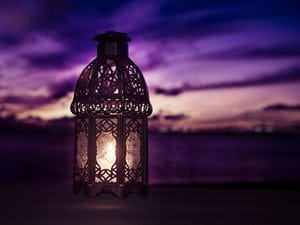
Ramadan, which falls on the ninth month of the Islamic lunar calendar, is the most religiously significant time of year for Muslims throughout the world. It marks the month in which the Quran—the holy text of Islam—was revealed to the Prophet Muhammad by the archangel Gabriel in 610 CE.
This is a month of fasting, prayer, and reflection for Muslims. During this time, Muslims refrain from eating or drinking from sunrise to sunset, and strive to avoid thoughts and behavior which are considered to be impure under the tenets of Islam. Muslims believe that the spiritual rewards for this good behavior are increased during Ramadan.
This fast is broken each day with a meal shared amongst family and friends, and the end of Ramadan culminates in a three-day festival, known as Eid al-Fitr.
The origins of Ramadan lie in the life of Muhammad, the founding prophet of Islam, and in the story of his encounter with the divine.
The First Ramadan
When Muhammad was forty, he began to spend time in solitude, thinking on questions which troubled him. To do this, he took on the habit of retreating to a cave within a mountain called al-Ḥirā for a month at a time.
One year, around 610 CE, Muhammad went up to al-Ḥirā on a day like any other, but he was soon visited by the archangel Gabriel, who took hold of Muhammad and commanded terrified man to “read.” Muhammad was so afraid that he refused twice before actually asking what it was he was supposed to read.
Gabriel replied with this.
"Proclaim! in the name of thy Lord and Cherisher, Who
Created man, out of a clot of congealed blood:
Proclaim! And thy Lord is Most Bountiful,–
Who taught by the pen–
Taught man that which he knew not."
Gabriel then proclaimed that “Thou art the messenger of God and I am Gabriel,” and Muhammad fled the cave, thinking that he had been accosted by an evil spirit. He ran down the mountainside, and as he did, the angel, Gabriel, appeared in its true form in the sky above him, filling the entire sky, which had become green, which, incidentally, is where Islam gains its official color.
When Muhammad returned home, he told his family of what had happened, and when he sought the wisdom of a particularly devout Christian relative, he was told that he had been chosen as a prophet of God.
Shortly after, Muhammad began to receive further revelations from Gabriel, as well as from the realizations of his own heart. According to hadith—the stories about Muhammad’s life—all holy scriptures were sent down during Ramadan, making these 30 days the holiest in this religion.
The Traditions of Ramadan
As one of the Five Pillars of Islam—the fundamental acts of Islamic worship—Ramadan is rife with sacred traditions.
The beginnings and endings of Ramadan are ruled by the lunar cycles, and so the beginning of this holy month typically falls a day or so after the new moon. At this time, many Muslims decorate their homes with lamps, lights, crescents, and stars. Although make no mistake—Ramadan isn’t a time for celebration, but rather for spiritual reflection.
The use of lanterns is beautifully prevalent, with these lights being commonly hung at shops, homes, streets, and many other places. This tradition may have originated in Egypt, where, during the Fatimid Caliphate, Caliph al-Mu’izz li-Din Allah was greeted by lantern-holders to celebrate his rule.
The central activity of Ramadan is, of course, fasting. For the entire month, Muslims refrain from eating while the sun is shining, with the exception of those who are elderly, ill, or have any other condition which might preclude fasting.
This fasting must be intentional. The concept of niyyah—which means “intention”—guides the fasting of Ramadan. Muslims must willfully dedicate their fast to Allah alone in order to achieve niyyah.
Each day, this fast is broken after sunset, often with dates, as the Prophet Muhammad recommended. Muslims gather their friends and families in what are called Iftar parties to eat in fellowship.
After breaking the fast, but before eating dinner, Muslims offer the fourth of their five daily prayers—the Maghrib prayer, and after dinner, they make their way to their Mosques to offer the fith daily prayer, known as the Isha prayer. The day will often end with a special voluntary prayer called Taraweeh, which is offered by the congregation.
The final ten days of Ramadan are considered some of the most holy. The 27th night is of particular importance—this is called the “Night of Power.” This is the night that Muhammad received his first revelation, and many Muslims spend this day praying and reciting the Quran.
After the 30 days of Ramadan have passed, the month concludes in a celebration, known as Eid-ul-Fitr, wherein Muslims gather to offer prayers of thanks. Delicious dishes are prepared for the occasion, and Muslims everywhere visit friends and exchange gifts during this time.
A Month of Faith
This isn’t just a time for abstract reflection—Ramadan has a real, practical purpose that creates real changes within those who observe it.
Ramadan is all about growing nearer to God. Physically carrying out tasks solely for God helps Muslims to feel that He is a reality in their lives, and bequeaths a sense of purpose and direction.
It is also about developing and strengthening powers of self-control so that, throughout the rest of the year, sinful desires and thoughts can be better resisted.
Finally, Ramadan is a great time to learn and practice charity, kindness, and generosity. Deprivation and fasting helps Muslims to remember the plight of those less fortunate, as well as those blessings that may normally be taken for granted.
Above all, those who observe Ramadan find themselves with a chance to truly contemplate their faith and rid themselves of those bad habits they have accumulated over the previous year. It is a time unlike any other in the Islamic calendar, a sort of “reset button” for the soul.
For Muslims, Ramadan was founded so that humankind could benefit from its customs to change themselves for the better, strengthening their bond with God and enabling themselves to make the world a better place.

